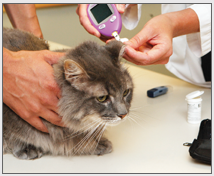Home / AlphaTrak
diabetes complications
Diabetes Complications
Most pet owners are able to control their pets’ diabetes with little issue. However, it is important to be able to recognise complications, should they arise. If you suspect any complications with your pet’s diabetes, contact your veterinary surgeon immediately.
These are some complications associated with diabetes:
-
Hypoglycaemia occurs when blood glucose levels fall below normal, resulting in a lack of energy source needed to support cell function. Hypoglycaemia can be life threatening, so knowing and watching for signs is important.
- Signs
- Weakness, shaking, unsteadiness
- Lethargy or unresponsiveness
- Seizures
- Common Causes
- Accidental administration of too much insulin
- Not enough food taken with or prior to insulin administration
- Vomiting prior to insulin injection
- Unusually high amount of exercise or activity
What To Do If You Suspect Hypoglycaemia:
Contact your veterinary surgeon immediately. DO NOT administer more insulin. Always have table syrup, honey or sugar water on hand, and rub it on the gums or under the tongue to bring your pet’s blood glucose back to a safe level. Never try to feed a seizing animal, as choking could occur.
- Signs
-
DKA results when glucose levels get dangerously high (also known as hyperglycaemia). When your pet develops DKA, ketones—a type of acid—accumulate in the blood, causing a chain reaction that can result in critical dehydration and other issues.
- Signs
- Fatigue, feeling weak, vomiting
- Excessive thirst
- Anorexia
- Frequent urination
- Sweet breath odour
- Common Causes
- Uncontrolled diabetes
- Insufficient insulin
- Missed insulin doses
- Infections
- Stress
What To Do If You Suspect Diabetic Ketoacidosis
DKA is a life-threatening condition and requires medical attention. DKA cannot be treated at home. It often involves intravenous fluids to rid the system of ketones and replace depleted electrolytes. If you suspect DKA, call your vet, the out of hours practice or follow your veterinary surgeon’s instructions of what to do in the emergency.
- Signs
-
Diabetic Neuropathy results when nerves in the legs are progressively damaged due to prolonged hyperglycaemia or elevated blood glucose. This leads to hind limb weakness and difficulty walking, jumping and climbing, particularly in cats.
- Signs
- Trouble walking, jumping or climbing
- Feet dragging or odd paws curling
- Loss of bladder or bowel control
- Common Causes
- Uncontrolled diabetes
- Prolonged periods or a history of high blood glucose levels
What To Do If You Suspect Diabetic Neuropathy
Diabetic Neuropathy is treatable. In early stages, the condition can be reversed with accurate regulation of blood glucose levels and supplements that promote nerve growth. Your veterinary surgeon will treat neuropathy and may give you a treatment regimen to follow. Contact your veterinary surgeon if you suspect your pet is exhibiting one or more signs of neuropathy.
- Signs
-
Cataracts develop in dogs when the clear lens of the eye becomes cloudy. A healthy lens absorbs glucose from the eye fluids for its energy needs. Cataracts occur when excess glucose due to unregulated diabetes pulls water into the lens. This disrupts lens clarity and impairs vision.
- Signs
- Cloudy eye(s), spots in the eye
- Signs of impaired vision: bumping into objects and not recognising family members
- Common Causes
- Uncontrolled diabetes
- Genetics
- Age
- Trauma
- Toxins
What To Do If You Suspect Cataracts
Cataracts are treatable. Contact your veterinary surgeon if you suspect that your dog has cataracts.
- Signs
The best way to manage complications from diabetes is to prevent them. Learning the importance of at home testing and keeping a blood glucose monitor at home is a good way to keep your pet’s diabetes under control. By being able to test blood glucose at home, you can also provide your veterinary surgeon with valuable information in the case of complications. To learn more about at home testing, click here.


- Argentina
- Australia
- Austria
- Belgium
- Bolivia
- Brazil
- Bulgaria
- Canada
- Chile
- China
- Colombia
- Costa Rica
- Croatia
- Czech Republic
- Denmark
- Ecuador
- Egypt
- Estonia
- Ethiopia
- Finland
- France
- Germany
- Ghana
- Greece
- Hungary
- India
- Indonesia
- Ireland
- Israel
- Italy
- Japan
- Kenya
- Latvia
- Liberia
- Lithuania
- Malawi
- Malaysia
- Mauritius
- Mexico
- Morocco
- Mozambique
- Netherlands
- New Zealand
- Nigeria
- Paraguay
- Peru
- Philippines
- Poland
- Portugal
- Romania
- Russia
- Serbia
- Singapore
- Slovakia
- Slovenia
- South Africa
- South Korea
- Spain
- Switzerland
- Taiwan
- Tanzania
- Thailand
- Turkey
- Uganda
- Ukraine
- United Kingdom
- United States
- Uruguay
- Vietnam
- Zambia
- Zimbabwe
You are leaving the country website to access another site in the group.
Regulatory constraints and medical practices vary from country to country. Consequently, the information provided on the site in which you enter may not be suitable for use in your country.

